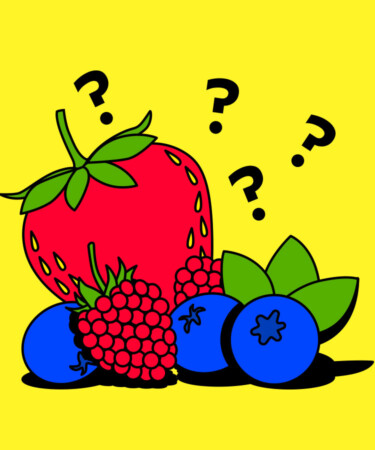This article is part of our Cocktail Chatter series, where we dive into the wild, weird, and wondrous corners of history to share over a cocktail and impress your friends.
Sometime around second grade, many of us were given some shocking information in science class: Any food with a seed is technically a fruit. The notion that peppers, string beans, tomatoes, or even eggplants aren’t vegetables was somewhat shocking. Well, get ready to have your world rocked once again: Most of your favorite berries aren’t berries at all.
It turns out the term “berry” isn’t actually meant to describe the adorably tiny, sweet and sour fruits we know and love, but is actually a botanical definition of a certain category of fruits that — get this — doesn’t actually include raspberries, blackberries, or strawberries.
The botanical definition of a berry, according to Britannica, is a “simple, fleshy fruit that usually has many seeds.” It also specifies that “a berry is derived from a single ovary of an individual flower.” This means that blueberries and cranberries are, indeed, berries. Other fruits that fit this description include grapes, bananas, avocados, cucumbers, tomatoes, and pumpkins. Yes, a pumpkin is a berry and a raspberry is not — welcome to your new reality.
So, if raspberries and strawberries aren’t technically “berries,” what are they? Botanically speaking, they are actually aggregate fruits, defined as “fruits that are formed from a single flower with many pistils, each of which develops into small ‘fruitlets.’” This essentially means they are fruits made up of a consolidation of many smaller fruits. If this is the case, then why did we all grow up under the impression that these bite-sized fruits were all one happy berry family? That remains a mystery.
Even though we now know the shocking truth, we definitely plan to keep using “berry” colloquially. Otherwise, we would have to revamp recipes like our Mixed Berry Sparkling Lemonade to include a blend of true “berries” like tomatoes, grapes, and kiwis. Alternatively, we could change the cocktail’s name to “Aggregate Fruit Sparkling Lemonade,” though that doesn’t quite roll off the tongue.
